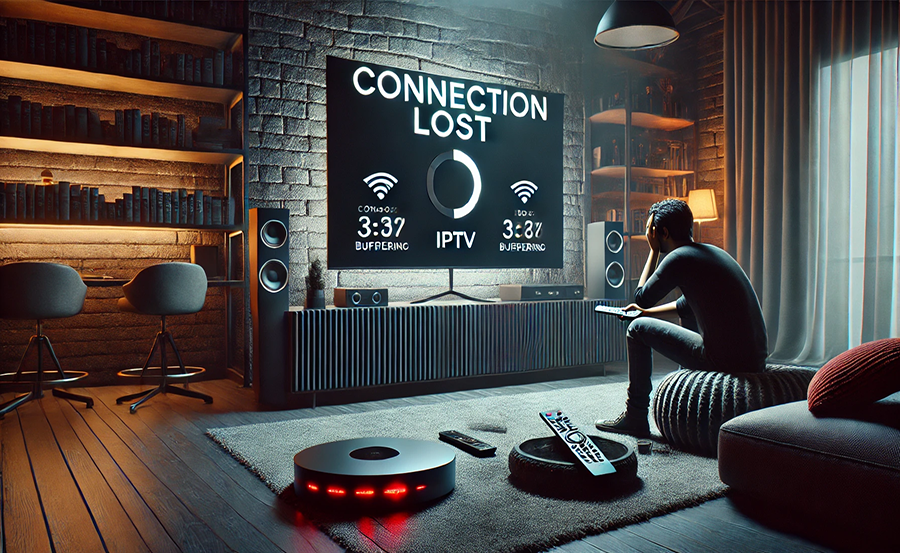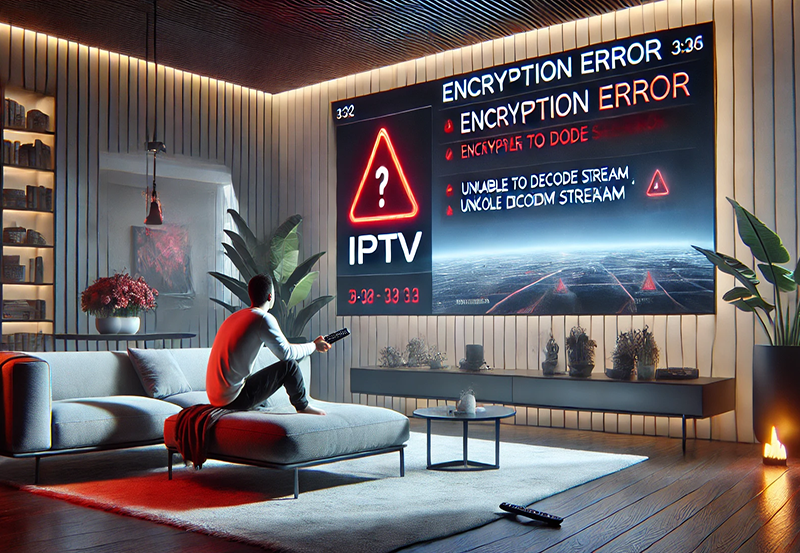In today’s fast-paced world, seamless entertainment is more of a necessity than a luxury. With the surge in online streaming platforms, Internet Protocol Television (IPTV) has emerged as a leading technology for delivering high-quality TV content over the internet. However, with great tech advancements come challenges like connectivity issues that can disrupt your viewing pleasure. As avid users delve into the world of IPTV, understanding the intricacies of connectivity problems and solutions becomes paramount.
Buy 1 Year IPTV Subscription and Enjoy Unlimited Content
Understanding the Basics of IPTV
What is IPTV?
In simple terms, IPTV allows you to stream television content using the internet instead of traditional cable or satellite methods. It offers a diverse array of channels and on-demand content, making it a desirable choice for consumers. But what’s under the hood of IPTV?
The technology leverages a broadband internet connection to deliver media, freeing users from the constraints of standard broadcast systems. This tech evolution has led to the rise of Top IPTV subscriptions and the best IPTV services for streaming movies, changing how we consume entertainment.
How IPTV Differs from Traditional Broadcasting?
If you’re transitioning from cable or satellite TV, understanding the fundamental differences is crucial. Unlike traditional broadcasts that deliver signals directly to your TV via cables or satellites, IPTV utilizes internet protocols to transmit content.
This digital shift means that IPTV is more flexible and capable of offering a personalized viewing experience. But it also relies heavily on a robust internet connection, making connectivity a focal point when considering the best IPTV for streaming movies.
Common IPTV Connectivity Issues
Buffering: The Unending Wheel of Frustration
Buffering is, without a doubt, one of the most dreaded issues for IPTV users. It’s that moment when your video stops playing, leaving you in suspense. This often occurs due to slow internet speeds or network congestion.
Several factors contribute to buffering, but rest assured, avoiding black screens and loading circles is possible. The key lies in optimizing your setup and understanding your network’s limitations to amplify your IPTV enjoyment effortlessly.
Network Drops and Unstable Connections
Nothing is more annoying than a dropped connection during an intense moment in a movie or sports event. Inconsistent network connectivity can ruin your experience and leave you searching for answers. Often, this is caused by weak Wi-Fi signals or interference from other devices.
Thankfully, addressing network instability can be a straightforward process. Whether through hardware upgrades or minor settings adjustments, improving your connection can restore your viewing experience to its full potential.
Solutions to Common Connectivity Issues
Enhancing Internet Speed and Stability
To combat buffering and network drops, ensuring a stable and fast internet connection should be your first step. Consider upgrading your internet plan or switching to a wired connection to minimize interruptions.
Optimizing your network involves both hardware and software changes. Installing a high-quality router, placing it optimally, and regularly updating firmware can fortify your IPTV setup immensely.
Optimizing Streaming Devices
Your streaming device plays a pivotal role in how content is delivered to your screen. Older devices might lack the processing power needed for seamless streaming. Regular device maintenance, including software updates, is crucial.
Moreover, investing in an IPTV-specific device could enhance the quality of your streaming experience. These devices are designed to handle high-definition content, providing a smoother and more reliable service for users who demand quality.
Checklist for Device Optimization:
- Ensure the latest software updates are installed.
- Close unused applications to free up resources.
- Perform regular device reboots to clear cache.
Choosing the Right IPTV Service Provider
Factors to Consider When Selecting a Provider
With the growing popularity of IPTV, the market is flooded with service providers, each promising the ultimate viewing experience. Knowing what to look for can be daunting, but certain factors consistently stand out.
The quality and reliability of service should be your primary focus. Look for providers offering robust customer support, varied channel options, and compatibility with multiple devices. Balancing these aspects with cost will help you find the Top IPTV subscriptions that match your entertainment requirements.
Evaluating Performance and Reviews
Sifting through customer reviews and testimonials can offer invaluable insights. While no service is free from issues, consistent negative feedback should raise red flags. Use review platforms and community forums to gauge user satisfaction.
When considering the best IPTV for streaming movies, examine the providers’ ability to deliver uncompressed, high-definition content. Reviews focusing on video quality and service uptime are particularly useful in evaluating performance reliability.
Advanced Connectivity Solutions
Leveraging VPNs for Better Performance
Virtual Private Networks (VPNs) have gained popularity not only for security but for enhancing streaming experiences. By encrypting your connection, VPNs can prevent throttling by ISPs, ensuring better bandwidth for IPTV content.
However, not all VPNs are created equal. Prioritize those offering high-speed servers and dedicated streaming services to maximize your IPTV performance effectively.
Exploring Network Optimizations and Hardware Upgrades
Sometimes, the simple act of upgrading network hardware—such as routers or repeaters—can dramatically improve connectivity. Ensuring modern, dual-band routers can help manage your home’s internet traffic efficiently.
Implementing a Quality of Service (QoS) setting on routers can prioritize IPTV traffic, reducing interruptions and allowing you to amplify your IPTV enjoyment effortlessly.
Creative Tactics to Enhance Viewing Experience
Ensuring Hotspot Readiness
While a home internet setup is ideal, having a reliable mobile hotspot can serve as a backup when primary connections fail. Preparing for those unforeseen moments can save you a lot of frustration.
Testing and setting up your mobile device as a hotspot beforehand ensures that you’re not scrambling during critical moments. Being proactive about alternative connectivity solutions is wise.
Utilizing Community Resources
The communal knowledge found in online forums can be a treasure trove for troubleshooting advice. Whether you’re a neophyte or a savvy tech user, crowdsourced solutions often provide practical fixes adjusted to real-world usage.
Engage within IPTV communities where users share firsthand experiences, tips, and tricks. Subscribing to forums can help you stay informed about trends, settings tweaks, and provider performance updates.
The Path Forward: Embracing Connectivity Challenges
As IPTV continues to redefine television viewing, embracing potential connectivity challenges with the right strategies ensures you stay ahead in the digital viewing landscape. While issues might arise, they need not hinder your entertainment growth. With proactive measures, you’re equipped to maximize your IPTV experience, seamlessly bringing tomorrow’s entertainment into today’s living room.
Frequently Asked Questions (FAQ)

What internet speed is optimal for IPTV streaming?
A minimum of 10 Mbps is recommended for standard definition content, while 25 Mbps or higher is preferable for high-definition streaming to avoid buffering.
Can using a VPN affect my IPTV connection?
Yes, a VPN can influence your connection, both positively and negatively. While it can prevent ISP throttling and enhance security, some VPNs might slow down your speed. Choose a high-speed VPN for the best results.
How can I reduce buffering on my IPTV?
First, ensure you have a stable and fast internet connection. Reduce the number of devices using the network and consider a wired connection. Regularly updating your device and using Quality of Service settings on your router can help too.
Is there a risk of IPTV services being interrupted?
Yes, since IPTV relies on the internet, network outages or provider issues can interrupt services. Choosing a reliable provider and having a backup internet solution is advisable.
Are IPTV-specific boxes necessary?
While not essential, IPTV boxes can offer optimized performance compared to general-purpose devices. They often support better quality streaming and are less prone to compatibility issues.
What should I do if my IPTV subscription is lagging?
Check your internet connection first. Restart your device and router. If issues persist, contact your service provider as they may be experiencing technical difficulties.
IPTV Smarters Explained: How It Enhances Your Viewing Experience





